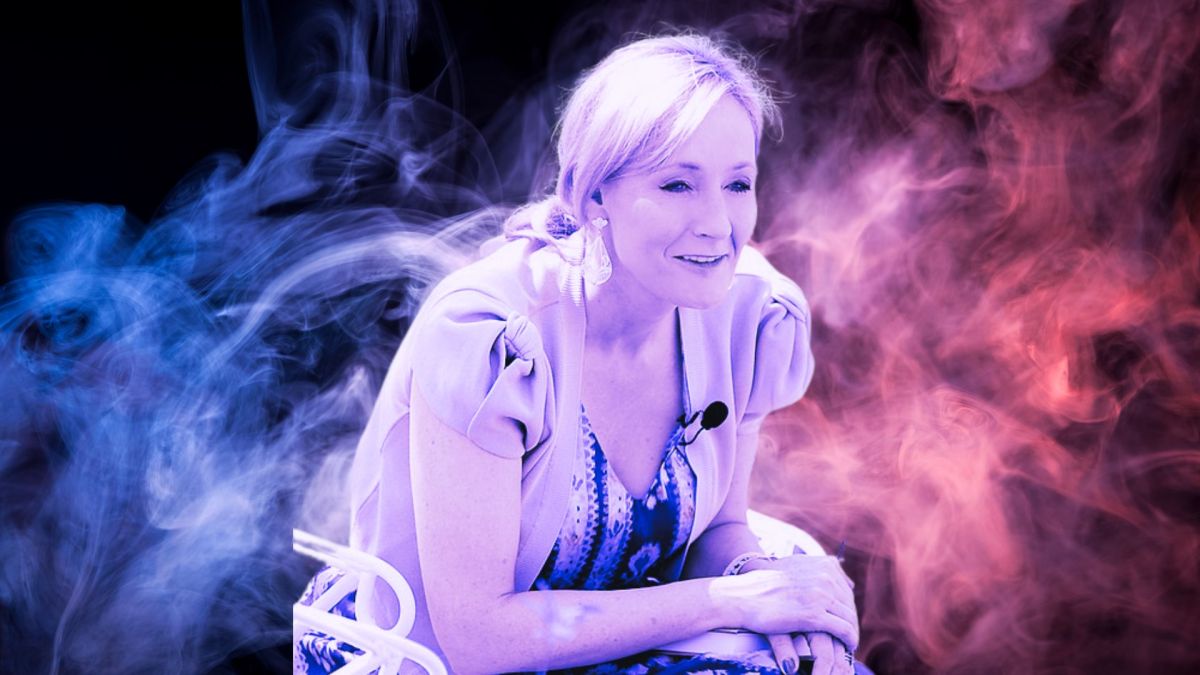Content warning: some of the articles and posts linked to from this article contain anti-trans sentiment and language. These do not reflect the opinions of this article’s author.
When HBO announced its long-rumoured Harry Potter reboot, the reaction of the masses was predictably split between nostalgic excitement and deep discomfort.
The prospect of a decade-spanning TV series that promised a ‘faithful adaptation’ of the original books might have seemed like a dream for Harry Potter adults and fantasy diehards.
But for many others – not least in Australia’s vibrant queer and trans communities – it rang as a tone-deaf commitment to something far more insidious than magical.
I’m strongly of the opinion that this show is not just a harmless reboot – or even that it’s just another shameless cash grab. In many ways, it’s an active reinforcement of what many perceive to be JK Rowling’s increasingly radical anti-trans agenda.
Harry Potter and The Transphobe’s Dilemma:
Is JK Rowling actually transphobic?
Rowling has said on the record that she’s being mischaracterised as anti-trans and that her advocacy (for cis women) comes from her own experience as a survivor of domestic violence and sexual assault.
Speaking on the podcast The Witch Trials of JK Rowling, she denied ever being transphobic, and said that she respects ‘every trans person’s right to live in any way that feels authentic and comfortable to them’, and that she wants trans people to be free from discrimination and abuse (as reported in this BBC piece).
But she also wrote on her blog in 2020: ‘When you throw open the doors of bathrooms and changing rooms to any man who believes or feels he’s a woman […] you open the door to any and all men who wish to come inside’.
Her main point of contention seemed to be this: trans people are fine, as long as they don’t exist in the spaces she considers to be sacred and immutably linked to gender roles (e.g., women’s bathrooms).
She wrote in October of 2023 that she would ‘happily’ do jail time over her views on transgender folk.
Harry Potter money funds ‘women’s sex-based rights’ org
In May 2024, Rowling launched the JK Rowling Women’s Fund (JKRWF), a self-funded organisation offering legal support for cases defending what she terms ‘women’s sex-based rights’ – a phrase that’s become code for efforts to legally exclude trans women from public life.
The fund was announced via a Tweet that suggested she had ample wealth to fund it herself, which certainly tracks: Rowling’s reported net worth currently hovers at £945 million (AUD$1.9 billion), fuelled in large part by the continued monetisation of Harry Potter IP across books, films, merchandise, theme parks, video games, and the new HBO series.
The fund’s purpose is explicitly political. The website outlines its intention to support ‘individuals and organisations fighting to retain women’s sex-based rights in the workplace, in public life, and in protected female spaces.’ In the fine print, it explains that it will fund litigation related to these matters.
Given the clear gender-essentialist agenda behind the fund, it’s easy to see how it could be used to target trans people’s rights under the guise of feminism.
This comes after Rowling personally donated £70,000 to For Women Scotland – an anti-trans advocacy group that recently won a controversial legal battle in the UK Supreme Court, which ruled that the Equality Act’s legal definitions of ‘man’ and ‘woman’ are based solely on birth-assigned sex. Rowling celebrated the ruling.
She also founded Beira’s Place, a rape crisis centre in Edinburgh that explicitly excludes trans women from receiving help.
When HBO revealed that Rowling was ‘quite involved‘ in the new Harry Potter series (via Deadline) – including script approval, casting oversight and executive producing duties – it sent shockwaves through the LGBTQIA+ communities.
But money talks, especially when in the realm of billions, so I guess we really shouldn’t have been so surprised.
Though ‘art vs artist’ has been talked about at length, sometimes we have to admit that indulging in a potential guilty pleasure like a new Harry Potter series is simply not a matter of ‘separating the art from the artist’.
While we can’t possibly know Rowling’s intentions with the money she makes from the IP (she also funds children’s charities, AIDS charities, Book Aid, dyslexia organisations and neurology clinics), we can assume at least some of it is directly funding the JKRWF and her personal donations to anti-trans groups.
Meanwhile, she uses her immense presence on social media to accuse trans athletes of fraud, and has been named in an ongoing harassment complaint in France for leading a smear campaign against boxer Imane Khelif during the Paris Olympics.
Can we definitively say that HBO are platforming a public figure whose activism has demonstrably harmed an already vulnerable group of people? No, because they’ve made it clear that the show stands apart as a production that’s separate from JK’s views.
HBO’s chief content officer Casey Bloys stressed that the upcoming series will not be ‘infused’ with the author’s controversial views on the transgender community (on The Town podcast, via Variety).
But the facts are these: every time this show is streamed, tweeted about, or merch is bought, it feeds the revenue machine that allows Rowling to bankroll more legal attacks against trans rights.
To quote GamesHub writer Percy Ranson (who wrote about the Hogwarts Legacy RPG and how it harms a community of human beings), these are the unavoidable pitfalls of consuming Harry Potter content:
- You’re directly supporting the royalty checks JK Rowling will receive for use of the Harry Potter intellectual property (IP).
- You’re financially signaling to the wider market that the Harry Potter IP is a profitable space, likely worth investing in with future titles. The more profitable the IP, the more money Rowling makes.
- You’re socially engaging with the IP and potentially broadening its audience, encouraging others to engage with it as well. This inevitably leads to more people being exposed to Rowling’s hateful beliefs, and potentially adopting it themselves.
‘She’s entitled to her views,’ continued Bloys about Rowling on The Town podcast. ‘If you want to debate her, you can go on Twitter.’
ScreenHub: The Wedding Banquet review: a joyous modern take on queer love
HBO’s Harry Potter series and Rowling’s involvement

The new Harry Potter series is expected to stretch over seven seasons and more than a decade of television – with Succession’s Francesca Gardiner as showrunner and Mark Mylod directing.
It has all the makings of prestige television, complete with a fresh-faced cast of child actors and heavyweight adult talent like John Lithgow, Janet McTeer and Paapa Essiedu (as Albus Dumbledore, Minerva McGonagall and Severus Snape, respectively).
The cast also includes:
- Katherine Parkinson as Molly Weasley
- Nick Frost as Rubeus Hagrid
- Johnny Flynn as Lucius Malfoy
- Bel Powley as Petunia Dursley and Daniel Rigby as Vernon Dursley
- Bertie Carvel as Cornelius Fudge
I want to be clear: the issue isn’t about the cast (especially those who are children, whose names I have deliberately left out of this piece). It’s about those in power – in other words, the people who had the choice to greenlight the show or sink it forever.
There is always bountiful discussion leading up to a show like this getting produced, and the timing of a release on streaming is usually intentional and precise.
It seems inconceivable that the controversy around Rowling’s Tweets and public statements didn’t come up in pre-production meetings – which suggests they ultimately weren’t deemed enough of an issue to halt production.
To reiterate: Rowling’s continued ownership of the IP and her executive producer credit mean that every single episode of Harry Potter will send money her way. HBO might try to paint her involvement as ‘fairly limited,’ but we’ve seen the receipts: she handpicked the writer, had opinions on the cast, and remains very much at the wheel.
For a streamer that increasingly talks a big game about diversity, inclusion and representation, continuing to centre someone like Rowling is more than hypocritical – it’s a betrayal of the very audiences networks like HBO claim to champion.
ScreenHub: Carnage for Christmas review: sleigh queens and bloody screams
What can we do about it?
For starters, we can stop pretending this reboot is a neutral cultural event. It isn’t. It’s a reminder Rowling’s IP is still bankable, whether or not you think her views are heinous.
There are so many good stories waiting to be told – queer fantasy, trans-centred hero’s journeys, gender-diverse ensemble dramas – and they don’t come with what could be seen as an attached hate fund.
Check out shows like Sense8, Pose, The Umbrella Academy, Euphoria, Orange is the New Black, Sex Education, and Steven Universe for a start.
In a media landscape saturated with reboots and remakes, maybe the bravest thing we can do as viewers is to say ‘no thanks’ – not necessarily because we hate Harry Potter, but because we care about trans folk more.
HBO’s Harry Potter series does not yet have a release date.

![The Creators: [L-R] Tamara Asmar, Anna Barnes, Sarah Bassiuoni, Glen Dolman, Michelle Offen, Jessica Tuckwell, Monica Zanetti. Images supplied.](https://www.screenhub.com.au/wp-content/uploads/sites/4/2025/07/the-creators.webp?w=280)



